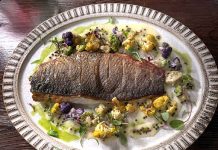
By Elizabeth Wulfhorst
Whether you prefer cats, dogs, lizards or birds, owning any pet doesn’t have to be a burden on the environment. From food to toys to bedding, options that won’t harm the planet but will make Fluffy and Fido happy and healthy abound. Pet owners may be surprised to learn just how easy it is to incorporate eco-friendly practices into their pet care routines.
EVERYBODY POOPS
Cleaning up pet waste is a dirty job, but someone has to do it. Dog feces can contain bacteria that will pollute waterways if left on the grass and hard surfaces. The Navesink and Shrewsbury rivers have both suffered from fecal bacteria contamination. To prevent toxic runoff, dog owners should scoop the poop. Flushing it down the toilet is the most environmentally friendly way of disposing of it, but at the very least it should be bagged in compostable or biodegradable bags like those made by Cycle Dogs and tossed in the garbage.
Most cat owners employ litter boxes for their furry friends. Natural and biodegradable litters include those made of corn or grain, wood, grass and walnut shells. Many will give you the same clumping performance as litters made from clay and silica gel and they reduce dust and control odor. Business Insider gives high marks to World’s Best Multiple Cat Unscented Litter, Ökocat Super Soft Clumping Litter and Littermaid Premium Walnut Litter.
If you can’t flush the waste, dispose of it in compostable bags made of maize flour and vegetable oil, like Planet Digestible Cat Waste Bags from Boba & Vespa.
TIME TO PLAY
Eschew the plastic toys and treat your pets to those made from hemp, organic cotton and wool.
Hemp is durable, renewable, grows without pesticides and is completely biodegradable, so at the end of the toy’s life you don’t have to feel bad about throwing it in the garbage. Organic cotton rope toys can satisfy the urge to play tug-of-war. Look for products without the ubiquitous squeakers found in most chew toys – they are made of plastic.
Hemp toys filled with organic catnip are the way to go for cat toys. Honest Pet Products makes many to choose from including the interactive Eco Cat Fisher with organic catnip, a removable bell and a durable natural hemp fish attached to a bamboo pole with natural hemp twine. Their products are made by disabled adults in Green Bay, Wisconsin.
CLEAN GREEN
Pets make messes, it’s inevitable. While chemical-based cleaning solutions can be effective and efficient, they are harmful to the environment and can be harmful to humans and animals as well. Various consumer advocacy organizations have noted that chemical-based cleaners are major sources of volatile organic compounds, or VOCs, which the U.S. Environmental Protection Agency notes can produce various short- and long-term adverse health effects. Natural cleaning solutions include baking soda for stains on carpet and fabric, distilled white vinegar and rubbing alcohol for stains on hard surfaces and products like Force of Nature which transforms vinegar into a completely nontoxic solution that cleans, disinfects and removes odors on most surfaces. As a bonus, most natural cleaners don’t come in plastic, but in easily recyclable glass or cardboard containers.

GOOD NIGHT
According to The Good Trade, “Most pet beds use cheap or mass-produced materials that fall apart… (and) even in-clude unhealthy or dangerous chemicals in the foam and stuffing.” But many companies now make comfy products for pets using material as varied as fabric made from recycled water bottles, wool and other textiles, upcycled cotton and hypoallergenic foam. Molly Mutt makes pet bed “duvet covers” that can be stuffed with your own old clothes, pillows and towels. Instead of those items ending up in a landfill, they get a second life as a soft place to sleep for your furry friend.
KEEP OFF THE LAWN
A big way to help pets, especially the ones who go outside, is to avoid using pesticides in the yard. The Pesticide Action Network notes that pets can absorb pesticides through their mouths, noses and eyes when walking through treated lawns and gardens. These toxic materials can stick to your pet’s fur and they could ingest the chemicals by chewing or eating plants that were treated with pesticides.
Backyard Boss suggests Espoma LS7 Organic Lawn Fertilizer, a 100-percent natural product that is safe for pets and humans, “and works wonders on lawns that need to be rejuvenated.” Organic lawn care practices, like using organic fertilizers and composting, will help keep your pet and the environment healthy.
This article originally appeared in the April 15 – 21, 2021, print edition of The Two River Times.














